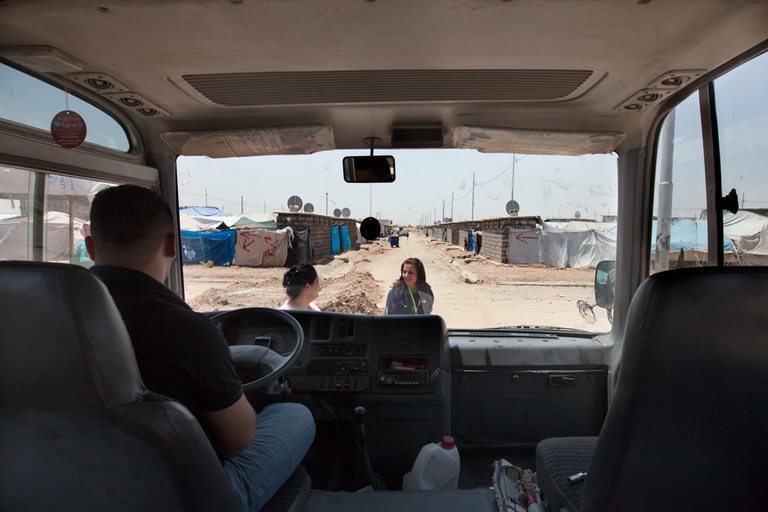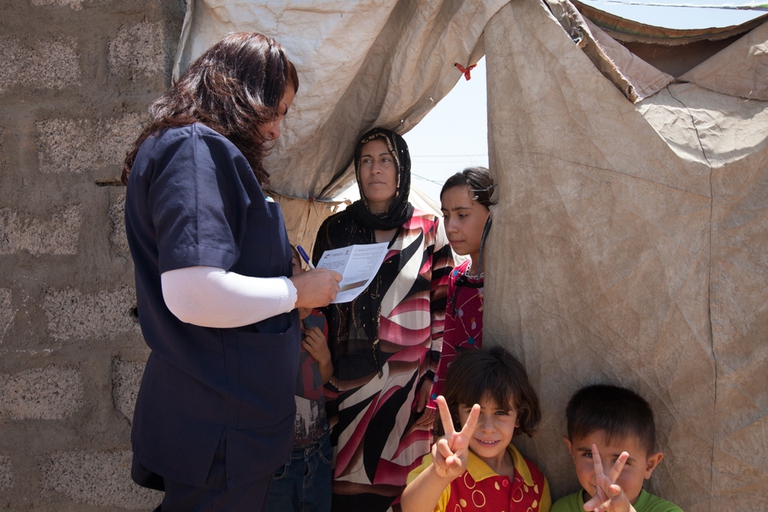
The Louise Michel is the humanitarian rescue ship saving lives in the Mediterranean. Financed by the artist Banksy, it has found a safe port in Sicily.
A minibus driven by female doctors who are fleeing from the Islamic State becomes a mobile clinic for all women living in camps located in the country’s remotest areas.
At first sight it seems a school bus. Actually, as you climb on board, your attention is captured by a stethoscope, scales, a sphygmomanometer (the instrument for measuring blood pressure) and a small chest full of medicines. The seats are replaced by two foldable examination tables that are fixed to the bus handles and three smiling women in blue coats welcome other women who crowd in front of the clinic to be visited. The mobile units are four-wheeled clinics that catch up with Syrian female refugees and Iraqi displaced women in the country’s remotest and most isolated regions, which are reachable with difficulty.
The Baharka refugee camp is in one of these areas. Located some fifteen kilometres away from Erbil, in Iraqi Kurdistan, the camp is home to more than 500 Iraqi families, displaced people who are fleeing from the Islamic State (or Daesh). There are many ethnic groups within the camp, including Shabak people and Turkmens, as well as Sunni families who decided not to live according to the Caliphate’s rules. The Islamic State annexed more than one-third of Iraq in June 2014 claiming Mosul as its capital. A few weeks ago the Iraqi army, Peshmerga Kurdish forces and other armed groups took the offensive under the leadership of the International Coalition to reconquering the stronghold of the Islamic State.
Around three million Iraqi civilians have been internally displaced in the last few years, according to the United Nations Refugee Agency (UNHCR): women, men and children were obliged to live in refugee camps in Northern Iraq in vulnerable conditions. War obviously worsened their living and health conditions. For this reason the Italian NGO Un ponte per (literally, a bridge for) decided to support the Jihan project (meaning life in Arabic) to provide women of all communities with reproductive and gynaecological health care services in free mobile and non-mobile clinics.
“From the beginning of the war Kurdistan’s healthcare system collapsed and many women couldn’t afford private treatments, due to large amounts of displaced people and refugees”, says head of “Un ponte per” project Marta Malaspina. Women from Iraqi, Kurd and Syrian communities come to these clinics. Female doctors working here are also fleeing war or the Islamic State.
Aya Alani, 26, came to Erbil in 2014 with her parents, brothers and sister. “I lived all my life in Baghdad, where I also studied. But as the situation was dangerous and tense there, we decided to move to a safer place, Tikrit, where my uncle lived”, she told smiling. “Then, when ISIS invaded the city we escaped again and came here, in Erbil”. Aya is an energetic and lively Sunni Muslim woman. She’s filled with passion while she visits her patients.
“We enter the camps with this minibus and women come to us to be visited or ask for advice”, the doctor explains while filling in a questionnaire on the women’s health problems. “They wait for us every day; we’ve become a point of reference for them”. The mobile clinic travels through the camp and sometimes nurses and doctors go into the tents to see if there are other women in need. “Our goal is taking care of all women”, she states with conviction. The main problems are: the large amount of pregnant women and infections caused by poor personal hygiene and the lack of water. “Nutritional problems caused by poverty exacerbate these pathologies”, Aya explains.
A young nurse standing next to the doctor measures blood pressure of women on the minivan. Her name is Raghda, she’s 24, and is Christian. She’s shier and more discreet than doctor Aya. She’s got blue eyes and a sad and elusive gaze. She comes from Mosul, the city where she was born and grew up. In 2014, the year when the Islamic State was created, she was obliged to leave her birthplace.
“My life was better once than it is now. We had our home, our work. I worked as a nurse in the Amadani hospital of Mosul. I was serene. Then, the world collapsed over me, or rather over us”, she explains. All women live in the same situation, whether they’re Christian or Muslim. They were in danger, they fled and now have to start a new life in another city.
“We love what we do, we help other women”, doctor Aya adds. “We’re luckier than these women. If we compare ourselves to the women who live in the camp, we understand that we live better than them. Certainly, it’s not easy for us, too, but we’re luckier than them”, she concludes.
As Aya and Raghda are finishing filling in the forms of the women they’ve visited during the day, another patient comes. Her name is Suad, she’s 33, and fled from Mosul in June 2014. She’s Sunni Muslim, too. “I was afraid that Daesh took my husband”, she confesses, “he’s a health worker and they need such professionals”. She covers her face because she doesn’t want to be photographed. “I still have relatives in Mosul, I can’t… I’m sorry”. Suad thinks she’s pregnant. Aya gives her a pregnancy test kit. After a while she had the hoped-for result. Suad is pregnant. Smiles appear on the patients’ and doctors’ faces, sharing Suad’s happiness. And to the answer: “How do you imagine your future?”, they answer: “In Mosul, together, as before, Inshallah”.
Siamo anche su WhatsApp. Segui il canale ufficiale LifeGate per restare aggiornata, aggiornato sulle ultime notizie e sulle nostre attività.
![]()
Quest'opera è distribuita con Licenza Creative Commons Attribuzione - Non commerciale - Non opere derivate 4.0 Internazionale.
The Louise Michel is the humanitarian rescue ship saving lives in the Mediterranean. Financed by the artist Banksy, it has found a safe port in Sicily.
Venezuelan refugees are vulnerable to the worsening outbreak in South America: while coronavirus doesn’t discriminate, it does affect some people more than others.
In the midst of India’s coronavirus lockdown, two dozen people lost their lives in a desperate bid to return home: migrant labourers forced to leave the cities where they worked once starvation began knocking at their doors.
Behrouz Boochani returned to being a free man during the course of this interview. The Kurdish writer was imprisoned by the Australian government in Papua New Guinea for six years.
The Global Compact for Safe, Orderly and Regular Migration was signed by 164 nations in Marrakech. This is what the non-binding agreement that encourages international cooperation stipulates.
The winners of the World Press Photo 2019 tell the stories of migrants in the Americas. From the iconic image of a girl crying on the border between Mexico and the United States to the thousands of people walking from Honduras towards a better life.
The Semìno project is a journey of discovery through different countries’ food habits, offering migrants employment opportunities and allowing us to enjoy the properties of vegetables from all over the world.
Travelling across the new route used by migrants to cross the Balkans and reach Trieste in Italy, a reportage that documents the social, economic and political changes of the countries along the way.
The countries hosting the most refugees aren’t the wealthy, Western ones. An overview by NGO Action Against Hunger reminds us that refugees and internally displaced people are far from being safe.









